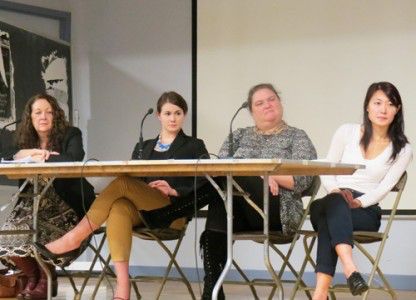A panel of four political experts and activists spoke to Boston University students Wednesday night about the importance of being politically aware and getting involved to make a difference before screening the first presidential debate.

“Part of the beauty of American democracy is if you organize, you can make changes,” said Denise Baer, the Director of the BU Washington D.C. Program.
Baer told students to think about the problems the country needs to solve, not necessarily about what the candidates are saying in their speeches and campaign ads. She said students need to pay attention to what the candidates neglect to say as well.
About 45 students attended the panel, entitled “Election! Our Voices, Our Votes” and cosponsored by the Center for Gender, Sexuality & Activism, to listen to Baer and three other panelists speak.
Sarah Sullivan, a BU alumna who founded the Center for Gender, Sexuality & Activism and a White House analyst, Whitney Taylor, a field director at American Civil Liberties Union of Massachusetts and June Tsang, a representative from Our Bodies Ourselves, also spoke to the crowd before they opened the floor for questions.
Tsang said she encouraged students to post on Facebook to advocate for the issues that directly affect women and students.
“For young women, eight out of 10 of us get our news from each other,” she said.
Taylor and Sullivan spoke about the protection of voters’ rights.
“We [ACLU] have many other instances of people being challenged on their color, on their last name [in Mass.],” Taylor said. “We are working with community organizations. We are working with people to register to vote. We are working on all of those issues.”
Taylor said her main goal “is to make sure that people feel safe and secure and good about executing their constitutional right to vote” on election day.
When asked what students could do to make their voices heard beyond the polls, Sullivan said they should think about issues that matter to them.
“I think what you can do on a really personal level is think about the issues that are affecting you and your friends — the people in your life,” Sullivan said.
Students who attended said they came to become more informed on the debates that would impact the presidential elections.
“It’s an important event,” said Swanson Ninan, public relations coordinator for the CGSA and a College of Arts and Sciences sophomore. “Its really good to be informed. Especially when you are deciding whether or not to vote and making a conscious decision to be informed on these issues.”
Mackenzie Tipton, a sophomore in the College of Communication, said listening to the speakers before the debate was an added bonus.
“Mainly I was looking for a group of people to watch the debate with,” she said. “I thought, ‘that’s a really cool add-on.’ I only really wanted to watch the debate, but I get to talk to all these cool people too.”
Rani Gupta, a COM senior, said talking about voting rights is very important to her.
“Especially with all the restrictions on voting that are occurring in various states,” Gupta said. “I wish everyone could attend something like this because it’s so important.”
This is an account occasionally used by the Daily Free Press editors to post archived posts from previous iterations of the site or otherwise for special circumstance publications. See authorship info on the byline at the top of the page.




The panelist were right on target!
Totally!